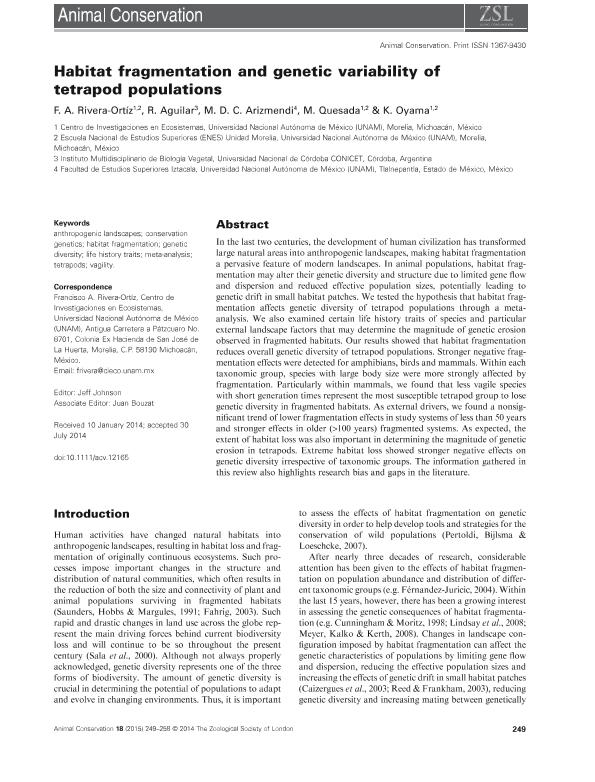Mostrar el registro sencillo del ítem
dc.contributor.author
Rivera Ortíz, F. A.
dc.contributor.author
Aguilar, Ramiro

dc.contributor.author
Arizmendi, M. D. C.
dc.contributor.author
Quesada, M.
dc.contributor.author
Oyama, K.
dc.date.available
2017-02-14T20:54:59Z
dc.date.issued
2015-06
dc.identifier.citation
Rivera Ortíz, F. A.; Aguilar, Ramiro; Arizmendi, M. D. C.; Quesada, M.; Oyama, K.; Habitat fragmentation and genetic variability of tetrapod populations; Wiley; Animal Conservation; 18; 3; 6-2015; 249-258
dc.identifier.issn
1367-9430
dc.identifier.uri
http://hdl.handle.net/11336/13017
dc.description.abstract
In the last two centuries, the development of human civilization has transformed large natural areas into anthropogenic landscapes, making habitat fragmentation a pervasive feature of modern landscapes. In animal populations, habitat fragmentation may alter their genetic diversity and structure due to limited gene flow and dispersion and reduced effective population sizes, potentially leading to genetic drift in small habitat patches. We tested the hypothesis that habitat fragmentation affects genetic diversity of tetrapod populations through a meta-analysis. We also examined certain life history traits of species and particular external landscape factors that may determine the magnitude of genetic erosion observed in fragmented habitats. Our results showed that habitat fragmentation reduces overall genetic diversity of tetrapod populations. Stronger negative fragmentation effects were detected for amphibians, birds, and mammals. Within each taxonomic group, species with large body size were more strongly affected by fragmentation. Particularly within mammals, we found that less vagile species with short generation times represent the most susceptible tetrapod group to lose genetic diversity in fragmented habitats. As external drivers, we found a non-significant trend of lower fragmentation effects in study systems of less than 50 years and stronger effects in older (>100 years) fragmented systems. As expected, the extent of habitat loss was also important in determining the magnitude of genetic erosion in tetrapods. Extreme habitat loss showed stronger negative effects on genetic diversity irrespectively of taxonomic groups. The information gathered in this review also highlights research bias and gaps in the literature.
dc.format
application/pdf
dc.language.iso
eng
dc.publisher
Wiley

dc.rights
info:eu-repo/semantics/openAccess
dc.rights.uri
https://creativecommons.org/licenses/by-nc-sa/2.5/ar/
dc.subject
Conservation Genetics
dc.subject
Genetic Variability
dc.subject
Vertebrates
dc.subject
Meta-Analysis
dc.subject.classification
Conservación de la Biodiversidad

dc.subject.classification
Ciencias Biológicas

dc.subject.classification
CIENCIAS NATURALES Y EXACTAS

dc.title
Habitat fragmentation and genetic variability of tetrapod populations
dc.type
info:eu-repo/semantics/article
dc.type
info:ar-repo/semantics/artículo
dc.type
info:eu-repo/semantics/publishedVersion
dc.date.updated
2017-01-31T15:37:01Z
dc.identifier.eissn
1469-1795
dc.journal.volume
18
dc.journal.number
3
dc.journal.pagination
249-258
dc.journal.pais
Reino Unido

dc.journal.ciudad
Londres
dc.description.fil
Fil: Rivera Ortíz, F. A.. Universidad Nacional Autonoma de Mexico. Centro de Investigaciones En Ecosistemas; México
dc.description.fil
Fil: Aguilar, Ramiro. Consejo Nacional de Investigaciones Científicas y Técnicas. Centro Científico Tecnológico Córdoba. Instituto Multidisciplinario de Biología Vegetal (p); Argentina
dc.description.fil
Fil: Arizmendi, M. D. C.. Universidad Nacional Autónoma de México; México
dc.description.fil
Fil: Quesada, M.. Universidad Nacional Autonoma de Mexico. Centro de Investigaciones En Ecosistemas; México
dc.description.fil
Fil: Oyama, K.. Universidad Nacional Autonoma de Mexico. Centro de Investigaciones En Ecosistemas; México
dc.journal.title
Animal Conservation

dc.relation.alternativeid
info:eu-repo/semantics/altIdentifier/url/http://onlinelibrary.wiley.com/doi/10.1111/acv.12165/abstract
dc.relation.alternativeid
info:eu-repo/semantics/altIdentifier/doi/http://dx.doi.org/10.1111/acv.12165
Archivos asociados
